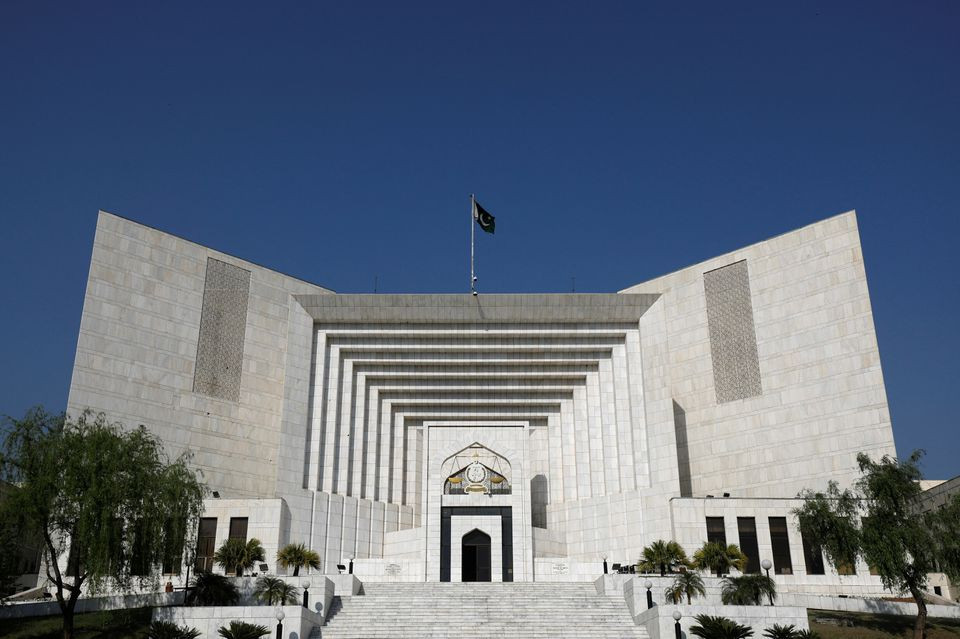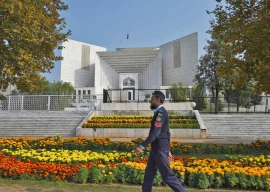
The top court has ruled that imposition of costs or fines would end the “frivolous, vexatious and speculative litigation” that unduly burdened the courts.
[This litigation gives an] artificial rise to pendency of cases which in turn clogs the justice system and delays the resolution of genuine disputes”, read a six-page judgment authored by Justice Syed Mansoor Ali Shah while hearing a frivolous case about the granting of a succession certificate of an amount of Rs32,185 left by the deceased father in a bank account.
A three-judge bench of the apex court led by Justice Syed Mansoor Ali noted that such litigation was required to be rooted out of the system and one of the options to curb the practice of instituting frivolous and vexatious cases was by imposing of costs under Order 28 Rule 3 of the Supreme Court Rules, 1980.
Read more: PTI to file plea in LHC for election date
“The spectre of being made liable to pay actual costs should be such as to make every litigant think twice before putting forth a vexatious claim or defence before the court,” it added.
The judgment noted that these costs in an appropriate case could be over and above the nominal ones.
They include the costs of the time spent by the successful party, transportation and lodging, if any, or any other incidental cost, besides the amount of the court fee, process fee and lawyer’s fee paid in relation to the litigation. “[The] imposition of costs in frivilous and vexatious cases meets the requirement of [a] fair trial under Article 10A of the Constitution, as it not only discourages frivilous claims or defences brought to the courthouse but also [the] absence of such cases allows more court time for the adjudication of genuine claims,” it added.
The SC noted that it also encouraged the litigants to adopt alternative dispute resolution (ADR) processes and arrive at a settlement rather than rushing to the courts.
“Costs lay the foundation for expeditious justice and promote a smart legal system that enhances access to justice by entertaining genuine claims,” it added.
In a nutshell, the SC noted, costs enouraged alternative dispute resolution; settlements between the parties; and reduces unnecessary burden off the courts, so that they could attend to genuine claims.
“Costs are a weapon of offence for the plaintiff with a just claim to present and a shield to the defendant who has been unfairly brought into court,” the judgment read.
The court noted that the power conferred by Section 476, CrPC on a civil, revenue or criminal court to take cognisance of certain offences committed in, or in relation to, any proceedings before it, is discretionary as evident from the expression, ‘may take cognisance’, used in the section.
Read more: PTI chairman undeterred despite Fawad's arrest
“No doubt, like all other discretionary powers, the court concerned is to exercise this discretion judiciously, not arbitrarily, while taking into consideration the facts and circumstances of the case, the verdict read.
“Previously, before its substitution by the Act XXI of 1976, Section 476 had stated it expressly that the court is to take action under Section 476 when it is of opinion that it is expedient in the interests of justice that an inquiry should be made into such an offence. As the discretionary powers must always be exercised in the interests of justice, we are of the considered view that notwithstanding the omission of that expression in the present Section 476, while exercising its discretion under this section the court concerned should give prime consideration to the question, whether it is expedient in the interests of justice to take cognisance of the offence,” the judgment read.



1725967717-0/Untitled-design-(3)1725967717-0-165x106.webp)
















COMMENTS (1)
Comments are moderated and generally will be posted if they are on-topic and not abusive.
For more information, please see our Comments FAQ